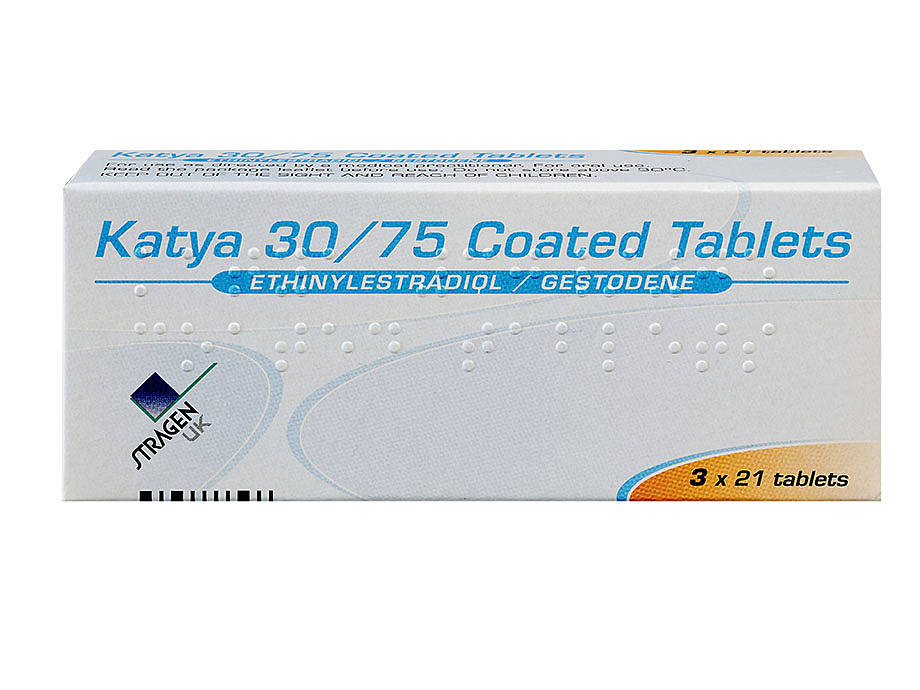Katya pill
Katya 30/75 is a combined oral contraceptive pill which can be taken to prevent pregnancy.






Prices from £16.00
In stock. Simply fill in a brief consultation questionnaire and one of our doctors will review your request today.
-
Katya is a combined oral contraceptive pill which is taken to prevent pregnancy. Katya 30/75 is is the generic version of the combined pill Femodene.
Katya 30/75 contains the active ingredients 30mcg ethinylestradiol and 75mcg gestodene. These are similar to the female sex hormones you produce. Katya is made by Stragen Pharmaceuticals.



About Katya
-
-
Katya is a combined oral contraceptive pill which you can take to help prevent pregnancy.
There are 2 types of hormone in each Katya pill. One is a type of oestrogen and the other is similar to progesterone. You produce both types naturally, and when you take them daily it can prevent pregnancy.
For Katya to work, you take 1 pill for 21 days in a row and then have a 7 day break, where you take no pills. However, you are protected for all 28 days as long as you do not miss any pills.
-
-
Take Katya as directed by your doctor or pharmacist. Normally, they will advise you to follow these steps:
- Take 1 pill every day for 21 days at the same time each day, and swallow it with some water if needed. You can take the pill with or without food.
- Take the pill marked with the current day of the week and follow the arrows for the next day pill.
- After 21 days you have a 7 day break where you take no pills for 7 days.
- You may have a withdrawal bleed (period-like bleed) that usually starts on day 2 or day 3 of the 7 day break.
- On the 8th day after your last Katya pill you should start the next strip of pills, and this will be on the same day of the month as the first strip. Do this even if your withdrawal bleed has not stopped, to remain protected.
For further information refer to the patient information leaflet.
-
-
Katya is a combined oral contraceptive pill that has 2 female sex hormones. These are ethyinylestrodiol (an oestrogen) and gestodene (a progestogen). Together these hormones work to:
- prevent the ovaries from releasing an egg (ovulation) - reducing the chance of pregnancy
- thicken cervical mucus - making it difficult for sperm to reach the egg
- thin the lining of the womb - making it difficult for an egg to implant
Other benefits of using combined oral contraceptives include keeping acne under control.
-
-
When used perfectly and as instructed, Katya is 99% effective. Katya is highly effective at protecting against pregnancy. If you start taking Katya during the first 5 days of your period it is effective as soon as you start taking it.
If started at a different time in the menstrual cycle you should use other additional methods of contraception (e.g. condoms). This should be for the first 7 days of taking Katya.
-
-
As with all medicines, including Katya, oral contraceptives may have some side effects. Not everyone will have side effects with Katya. Some side effects are more common than others. See below for possible side effects.
Common side effects of Katya include:
- headaches
- anxiety
- poor tolerance of contact lenses and visual disturbance
- nausea
- acne
- migraine
- weight gain
- fluid retention
- breakthrough bleeding (eases within a few months but contact doctor if persistent or heavy)
- no or reduced periods
- breast pain
- loss of interest in sex
- changes in mood including low mood
Uncommon side effects of Katya include:
- excess of fats in the blood
- vomiting
- high blood pressure (hypertension)
Rarely serious side effects may occur. Seek immediate medical attention if you:
- develop signs of a blood clot in the veins or arteries (sudden, severe pain or swelling in a limb, shortness of breath or chest pain)
- experience an allergic reaction
For other side effects, please see the leaflet in your box of Katya.
-
-
You can take Katya if you are a female and get regular periods. But you should not use Katya if you have:
- a history of blood clots in the legs (deep vein thrombosis, DVT), your lungs (pulmonary embolism, PE) or other organs
- a condition that affects your blood’s clotting
- an operation soon or are off your feet for extended periods
- a history of heart attacks or strokes
- chest pains (angina) or transient ischaemic attack (TIA)
- conditions that damage the lining of blood vessels, such as diabetes, high levels of fats in the blood and a condition called hyperhomocysteinemia
- migraine with aura (including visual symptoms)
- a history of inflammation of the pancreas (pancreatitis)
- a history of liver problems or liver tumours
- renal problems
- cancer of the breast or genital organs including if this is suspected
- unexplained vaginal bleeding
- an allergy to ethinylestradiol, gestodene or other ingredients in this medicine
- hepatitis C and are taking certain medications to treat this
- become pregnant or suspect you may be pregnant
You should inform your doctor if you have:
- inflammatory bowel disease (IBD including ulcerative colitis and Crohn’s disease)
- systemic lupus erythematosus (SLE)
- haemolytic uraemic syndrome (HUS)
- sickle cell anaemia
- raised levels of fat in the blood or a family history of this
- an operation soon or are off your feet for prolonged periods
- increased risk of blood clots
- Inflammation of veins under the skin (superficial thrombophlebitis)
- varicose veins
- history or family history of breast cancer
- liver or gallbladder problems
- diabetes
- epilepsy
- problems in pregnancy or with sex hormone use
- hereditary angioedema
- a history of migraines with aura
For further information please refer to the patient information leaflet for Katya. Contact a doctor if you have further questions about this medicine.
-
-
Some medications may interact with Katya. They may reduce the effectiveness of Katya or Katya may reduce their effectiveness. Examples include some:
- anti epileptic medications
- anti HIV medications
- anti hepatitis C medications
- immunomodulating medications
- herbal remedies, including St. John’s wort
-
-
Other hormonal contraceptive pills are available including:
- other combined pills
- the progesterone only pill or ‘mini pill’
Alternatives to taking a pill include:
- hormonal implants or injections - these are long term reversible methods or LARCs
- contraceptive coils including the IUD or IUS which are also effective long term (LARCs)
- barrier methods (condoms and diaphragms) which also protect against sexually transmitted infections (STIs)
You can read our guide to types of contraceptives. It has information on birth control methods and emergency contraception.

Dr Babak Ashrafi Clinical Lead for Service Expansion
Accreditations: BSc, MBBS, MRCGP (2008)
Babak studied medicine at King’s College London and graduated in 2003, having also gained a bachelor’s degree in Physiology during his time there. He completed his general practice (GP) training in East London, where he worked for a number of years as a partner at a large inner-city GP practice. He completed the Royal College of GPs membership exam in 2007.
Meet our doctorsLast reviewed: 14 Aug 2023
-
https://www.nhs.uk/conditions/contraception/ [Mar 2021][accessed Jan 2022]
-
Katya patient information leaflet [Dec 2018][accessed Jan 2022]
-
Combined pill, National Health Service [accessed Jan 2022]
Contraceptive pills are a reliable way of reducing your risk of getting pregnant from sex. ZAVA offers most common brands of pill, so you can order your preferred brand by visiting our contraceptive pill service page.
In stock. Prices from £16.00








